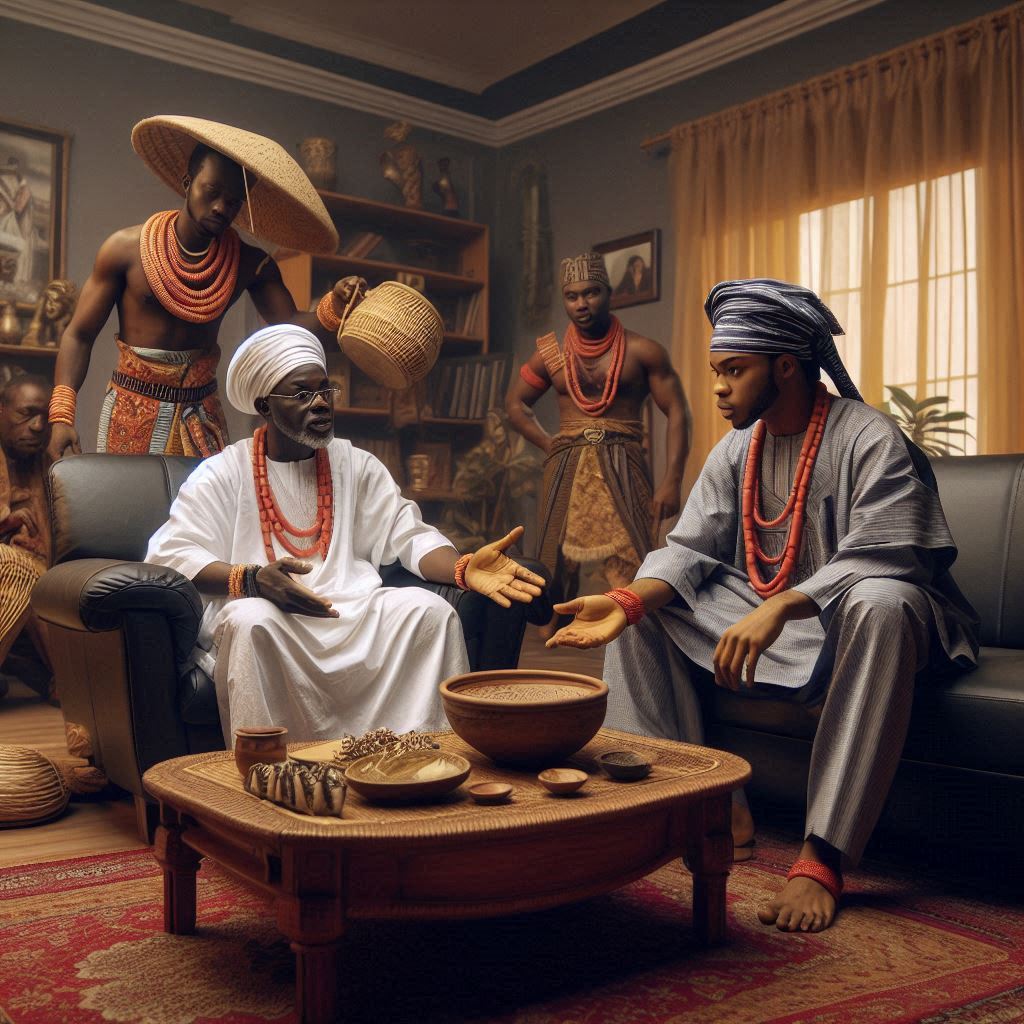Introduction
In the intricate tapestry of human society, sociology serves as a lens through which we examine the dynamics, structures, and functions of social systems.
Nigerian cultural studies, on the other hand, delve into the rich tapestry of traditions, beliefs, and practices that shape the identity of the Nigerian people.
The interplay between these two disciplines offers a captivating exploration into the essence of Nigerian society, shedding light on the intricate connections between culture and social phenomena.
Sociology, as a discipline, seeks to understand the complexities of human behavior within the context of social structures and institutions.
From examining patterns of social interaction to analyzing the impact of societal norms, sociology provides invaluable insights into the mechanisms that govern our collective existence.
Nigerian cultural studies, on the other hand, immerse us in the vibrant mosaic of Nigerian culture.
From the diverse ethnic groups to the colorful array of traditions and customs, this field of study offers a profound exploration into the identity and heritage of the Nigerian people.
It delves into the rituals, art forms, and oral traditions that have been passed down through generations, shaping the cultural landscape of the nation.
The intersection of sociology and Nigerian cultural studies opens up a realm of possibilities for scholarly inquiry and societal understanding.
By examining how cultural practices influence social structures and vice versa, we gain a deeper appreciation for the complexities of Nigerian society.
Overview of Sociology in Nigeria
Sociology in Nigeria emerges as a vibrant discipline, intricately woven into the fabric of its cultural tapestry.
Rooted in its historical trajectory, the development of sociology in Nigeria reflects the nation’s socio-political landscape, grappling with colonial legacies, post-independence challenges, and the quest for identity amidst diversity.
History and Development
The genesis of sociology in Nigeria can be traced back to the colonial era when European scholars ventured into the region, bringing with them Western sociological perspectives.
However, it wasn’t until the post-independence period that sociology began to take root as an academic discipline within Nigerian universities.
Influenced by scholars such as J.F. Ade Ajayi and Obaro Ikime, Nigerian sociologists embarked on a journey to contextualize sociological theories within the nation’s unique social milieu.
Key Sociological Theories and Concepts
Within the Nigerian context, sociologists have embraced a plethora of theoretical frameworks to analyze and interpret societal dynamics.
Structural functionalism, with its focus on the interdependence of social institutions, resonates deeply in understanding Nigeria’s complex social structure.
Similarly, symbolic interactionism offers insights into the symbolic meanings embedded in Nigerian cultural practices and interactions, elucidating the nuances of everyday life.
Moreover, critical theories like Marxism and feminism have provided a lens to critique power structures and inequalities prevalent in Nigerian society.
Issues of class struggle, gender disparities, and ethnic tensions are scrutinized through these theoretical frameworks, shedding light on the multifaceted nature of social stratification and oppression.
In recent years, indigenous sociological perspectives have gained prominence, advocating for the incorporation of traditional African values and belief systems into sociological discourse.
Scholars like Ifi Amadiume and Chinua Achebe have championed the cause of decolonizing sociology, emphasizing the importance of indigenous knowledge systems in understanding Nigerian society.
In short, sociology in Nigeria embodies a rich tapestry of historical legacies, theoretical frameworks, and indigenous perspectives.
As the discipline continues to evolve, it remains an indispensable tool for comprehending the intricacies of Nigerian cultural dynamics and fostering social change in a rapidly transforming society.
Read: Role of Religion in Nigerian Historical Context
Overview of Nigerian Cultural Studies
Cultural studies in Nigeria focus on the examination and analysis of various aspects of Nigerian culture.
This includes traditions, customs, beliefs, and values that shape the identity of the Nigerian people.
Definition and Scope of Cultural Studies in Nigeria
Cultural studies in Nigeria is an interdisciplinary field that seeks to understand how culture influences society and vice versa.
It includes the study of literature, art, music, folklore, religion, and language.
The scope of cultural studies in Nigeria is broad and encompasses different disciplines such as anthropology, sociology, history, and communication.
It explores the dynamic interactions between individuals, groups, and institutions within the cultural context of Nigeria.
Importance of Studying Nigerian Culture in a Global Context
Studying Nigerian culture in a global context is crucial for several reasons. Firstly, it helps to promote cultural diversity and understanding among people from different backgrounds.
By studying Nigerian culture, individuals can gain valuable insights into the customs, traditions, and values of the Nigerian people.
Furthermore, a better understanding of Nigerian culture can lead to the preservation and promotion of cultural heritage.
In a globalized world, where cultures are increasingly interconnected, it is important to safeguard and celebrate the unique aspects of Nigerian culture.
Studying Nigerian culture in a global context also contributes to the promotion of intercultural communication and cooperation.
By learning about the cultural practices and beliefs of Nigerians, individuals can build bridges of understanding and foster meaningful relationships with people from Nigeria and beyond.
Moreover, understanding Nigerian culture can also provide valuable insights into the social, political, and economic dynamics of the country.
Cultural studies can help individuals analyze the impact of culture on various aspects of Nigerian society, such as governance, education, and development.
In essence, the study of Nigerian culture in a global context is essential for fostering cultural diversity, preserving heritage, promoting intercultural communication, and gaining insights into societal dynamics.
Transform Your Career with Expert Guidance
Get personalized mentorship consulting that’s tailored to your unique path. Our expert advice is actionable and exclusive.
Get StartedIt is through cultural studies that we can truly appreciate the richness and diversity of Nigerian culture.
Read: Religious and Cultural Studies Job Market in Nigeria
Interplay between Sociology and Nigerian Cultural Studies
In the dynamic tapestry of Nigerian society, the interplay between sociology and cultural studies serves as a crucial lens through which to comprehend its complexities.
The fusion of these disciplines illuminates the intricate relationship between social structures and cultural practices, shedding light on the myriad influences that shape Nigerian identity and societal norms.
Impact of sociological perspectives on the study of Nigerian culture
Sociological perspectives offer invaluable insights into the study of Nigerian culture by examining the underlying structures and processes that govern social behavior.
Through concepts such as social stratification, power dynamics, and social institutions, sociologists unravel the intricate fabric of Nigerian society, revealing the nuances of class, ethnicity, and gender that intersect with cultural practices.
By employing theoretical frameworks like functionalism, conflict theory, and symbolic interactionism, sociologists analyze how cultural norms are both shaped by and shape social structures, providing a deeper understanding of the dynamics at play within Nigerian communities.
Role of cultural studies in understanding social issues in Nigeria
Conversely, cultural studies play a pivotal role in contextualizing social issues within Nigeria by examining the cultural dimensions that underpin them.
By exploring aspects such as language, religion, art, and media, cultural studies scholars unravel the meanings embedded within cultural artifacts and practices, elucidating their significance in shaping social identities and values.
Through interdisciplinary approaches that draw from anthropology, literary theory, and media studies, cultural studies offer nuanced perspectives on issues such as ethnic diversity, religious pluralism, and gender dynamics, providing valuable insights into the complexities of Nigerian society.
The symbiotic relationship between sociology and Nigerian cultural studies facilitates a holistic understanding of social issues by elucidating the interplay between structure and culture.
By bridging the gap between macro-level analyses of social structures and micro-level examinations of cultural practices, these disciplines offer a comprehensive framework for examining the intricacies of Nigerian society.
In doing so, they equip scholars, policymakers, and citizens with the tools necessary to address the challenges and opportunities that arise within Nigeria’s diverse cultural landscape.
Read: The Future of Sociology Education in Nigeria

Case Studies
One notable research project that combines sociology and Nigerian cultural studies is a study on marriage customs.
Examples of Research Projects
In this study, researchers examined how traditional marriage practices in Nigeria affect gender roles.
Another example is a study on the impact of religious beliefs on social interactions within Nigerian communities.
Researchers explored how spirituality influences social dynamics and cultural norms in Nigerian society.
Findings and Implications
These studies have shed light on the intricate relationship between sociology and Nigerian cultural studies.
One key finding is that traditional customs play a significant role in shaping societal values in Nigeria.
Researchers also discovered that religion serves as a powerful force in influencing social behaviors and interactions.
These findings have important implications for understanding social structures and dynamics within Nigerian communities.
By bridging sociology and Nigerian cultural studies, researchers can gain a deeper insight into the complexities of society.
Challenges and Limitations
Exploring the intersection of sociology and Nigerian cultural studies presents unique challenges and limitations that hinder a comprehensive understanding of Nigeria’s social dynamics.
These obstacles stem from methodological, contextual, and academic disparities that complicate research efforts.
Obstacles in studying the interplay between sociology and Nigerian cultural studies
One major obstacle is the diversity and complexity of Nigeria’s cultural landscape.
With over 250 ethnic groups, each with distinct languages, traditions, and social norms, capturing a holistic view of Nigerian culture is a formidable task.
Sociologists often struggle to account for this heterogeneity, leading to oversimplified analyses that may not accurately reflect the intricate realities of Nigerian society.
Another significant challenge is the lack of comprehensive and reliable data. In many regions, particularly rural areas, data collection is hampered by infrastructural limitations and political instability.
This results in a scarcity of empirical evidence necessary for thorough sociological and cultural studies.
Additionally, existing data may be outdated or biased, further limiting researchers’ ability to draw accurate conclusions.
Academic silos also pose a substantial barrier. Sociology and cultural studies often operate within distinct academic frameworks, leading to fragmented research approaches.
This division impedes interdisciplinary collaboration, which is crucial for studying the interplay between sociological theories and cultural practices in Nigeria.
Ways to overcome these challenges
To overcome these challenges, researchers must adopt a more integrative approach.
One way is by employing mixed-methods research that combines qualitative and quantitative data.
This approach can provide a more nuanced understanding of Nigeria’s diverse cultural context.
Engaging local scholars and communities in the research process can also enhance data accuracy and cultural relevance.
Furthermore, fostering interdisciplinary collaboration is essential.
Encouraging partnerships between sociologists, anthropologists, historians, and cultural scholars can bridge academic gaps and enrich the analysis of Nigerian society.
Establishing research networks and platforms for knowledge exchange can facilitate this collaboration, ensuring a more comprehensive and multifaceted exploration of the interplay between sociology and Nigerian cultural studies.
Therefore, while the challenges in studying the interplay between sociology and Nigerian cultural studies are significant, adopting integrative methodologies and fostering interdisciplinary collaboration can pave the way for more robust and insightful research.
Read: Exploring Nigerian Storytelling Through Film
You Might Also Like: Scholarships for International Politics Students Nigeria
Explore Further: Funding and Grants for Nigerian Fashion Startups
Learn More: Government Agencies Hiring Criminology Graduates
Gain More Insights: Ethnographic Research in African and Asian Studies
Importance of Interdisciplinary Approach
Sociology and Nigerian cultural studies complement each other.
Interdisciplinary approach fosters a holistic understanding.
It allows for a broader perspective on societal issues.
Bringing different fields together enhances knowledge and expertise.
Collaboration of disciplines strengthens research and analysis.
Interdisciplinary studies break down traditional academic silos.
It encourages creativity and innovation in addressing complex problems.
The integration of diverse perspectives leads to comprehensive solutions.
Benefits of Integrating Sociology and Nigerian Cultural Studies
It provides a nuanced understanding of Nigerian society.
Sociology offers theoretical frameworks to analyze culture.
Cultural studies add context to social structures and behaviors.
The combination enhances the depth of sociological research
It offers a multi-dimensional view of Nigerian culture and society.
Integrating both disciplines enriches academic discourse.
Sociology helps in examining power dynamics in cultural practices.
Nigerian cultural studies provide insight into societal norms and values.
How This Approach Can Contribute to a Deeper Understanding of Nigerian Society
By combining sociology and cultural studies, scholars gain diverse insights.
The interdisciplinary approach reveals complex interactions within the society.
It uncovers the historical and social contexts influencing Nigerian culture.
Understanding cultural practices through a sociological lens enhances analysis.
This approach helps in exploring the impact of globalization on Nigerian society.
It highlights the interplay between tradition, modernity, and social change.
Examining societal issues from multiple angles improves policy formulation.
Integrating sociology and cultural studies offers a comprehensive view of Nigerian society.
Delve into the Subject: Understanding Foreign Literary Genres and Movements
Conclusion
In the end, the interplay between sociology and Nigerian cultural studies offers a rich tapestry for exploration and understanding.
Through this interdisciplinary lens, we gain insights into the complexities of Nigerian society, its traditions, and its ongoing social transformations.
The significance of studying this interplay cannot be overstated.
It allows us to delve into the dynamics of cultural practices, beliefs, and norms within Nigeria, shedding light on how they intersect with broader social structures and processes.
By understanding these intersections, we can better grasp the root causes of social issues and devise more effective strategies for addressing them.
Throughout this post, we’ve seen how sociology provides theoretical frameworks and methodologies that complement the nuanced analysis of Nigerian cultural studies.
Whether examining kinship systems, religious practices, or modes of artistic expression, sociological perspectives help us contextualize these cultural phenomena within the broader social context.
In sum, the interplay between sociology and Nigerian cultural studies offers a fertile ground for inquiry and discovery.
It invites us to critically engage with the complexities of Nigerian society, while also recognizing the resilience and creativity of its people.
Through collaborative research and dialogue, we can continue to unravel the intricate connections between culture, society, and individual experience, contributing to a more nuanced and inclusive understanding of the world we inhabit.




